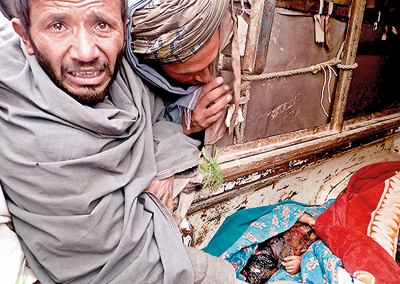Sunday Times 2
US soldier who killed Afghan villagers gets life without parole
View(s):TACOMA, Wash. (Reuters) – A decorated American soldier was sentenced to life in prison without the possibility of parole on for killing 16 Afghan civilians, mostly women and children. Army Staff Sergeant Robert Bales, a veteran of four combat tours in Iraq and Afghanistan, has admitted to slaughtering the villagers in attacks on their family compounds in Kandahar province in March 2012.
He pleaded guilty to the killings in June in a deal that spared him the death penalty, and a sentencing jury of six military personnel deliberated less than two hours on Friday before deciding he should spend the rest of his life in prison.

In this picture taken on March 11, 2012, an Afghan Villager cries over the bodies of Afghan civilians, who were allegedly shot by US soldier Staff Sergeant Robert Bales (AFP)
Bales, who appeared in a military court in Washington state in blue military dress, showed no emotion as the verdict was handed down, but his mother cried and rocked back and forth. Army prosecutors said Bales acted alone and with premeditation when, armed with a pistol, a rifle and a grenade launcher, he left his outpost twice during the night, returning in the middle of his rampage to tell a fellow soldier, “I just shot up some people.” The killings marked the worst case of civilian deaths blamed on a rogue U.S. soldier since the Vietnam War and further eroded strained U.S.-Afghan relations after more than a decade of conflict in Afghanistan.
“He wiped out generations and he ruined lives forever,” prosecutor Lieutenant Colonel Jay Morse told the jury in his closing arguments. “He should be known by one official title from this day until the day he dies: inmate.” In arguing for life without parole, Morse told jurors that Bales lacked a moral compass and played video in which Bales could be seen returning to base on the day of the killings, cloaked in a blanket snatched during the rampage.
“This is the walk of a cold blooded killer,” Morse said. Some Afghan survivors of the attack and family members of the victims who had been flown to the United States to testify about the impact of the shooting later expressed disappointment at a news conference that the penalty was not stronger.
“This murderer jumped into my house in the middle of the night, killed 11 members of my family and then burned them,” said villager Hajji Mohammad Wazir, who lost his wife and six of his seven children, among other relatives, in the attacks. “We were brought all the way here from Afghanistan to see if justice would be served. But not our way. The justice was served (in the) American way, their way,” he said. “We wanted this murderer to be executed but we didn’t get our wish.” Defense attorneys contended that Bales carried out the killings after suffering a breakdown under the pressure of the last of his four deployments to Iraq and Afghanistan. They have said he suffered from post-traumatic stress disorder and a brain injury even before shipping off to Kandahar province.
Bales told the jury on Thursday he had struggled with anger issues that worsened after his third military deployment, but that he had tried to disguise his problems behind a veneer of normalcy. He said he briefly sought treatment before his final deployment but stopped after he felt it was not working.
He also apologized, both to his fellow servicemen and to the Afghan villagers, for the killings, saying: “What I did is an act of cowardice behind a mask of fear, bullshit and bravado.” In seeking the possibility of parole for Bales, civilian defense attorney Emma Scanlan had tried to persuade the jury to look at Bales’ life in entirety while deciding on an appropriate sentence.
“We don’t throw out the first 38 years,” Scanlan said. “That doesn’t mean, again, that there is anything about this that is not completely horrific.” Scanlan read a letter Bales wrote to his children and family before the attack in which he compared Afghan children to his own, saying they love “to eat candy and play soccer.” “Those aren’t the words of a cold-blooded murderer who likes to kill innocent women and children,” Scanlan said.
comments powered by Disqus
